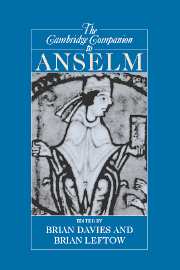Book contents
- Frontmatter
- Introduction
- 1 Anselm’s life, works, and immediate influence
- 2 Anselm on faith and reason
- 3 Anselm, Augustine, and Platonism
- 4 Anselm’s philosophy of language
- 5 Anselm on modality
- 6 Anselm’s perfect-being theology
- 7 Anselm and the ontological argument
- 8 Anselm’s account of freedom
- 9 Anselm on truth
- 10 Anselm on ethics
- 11 Anselm on the Trinity
- 12 Anselm on atonement
- Bibliography
- Index
5 - Anselm on modality
Published online by Cambridge University Press: 28 May 2006
- Frontmatter
- Introduction
- 1 Anselm’s life, works, and immediate influence
- 2 Anselm on faith and reason
- 3 Anselm, Augustine, and Platonism
- 4 Anselm’s philosophy of language
- 5 Anselm on modality
- 6 Anselm’s perfect-being theology
- 7 Anselm and the ontological argument
- 8 Anselm’s account of freedom
- 9 Anselm on truth
- 10 Anselm on ethics
- 11 Anselm on the Trinity
- 12 Anselm on atonement
- Bibliography
- Index
Summary
My aim is to discuss Anselm of Canterbury's use of basic modal terms (necessity, possibility, impossibility) and his interpretation of the meaning of these and some related notions. I will first sketch modal conceptions in philosophical and theological traditions with which Anselm was familiar, and then take a look at some eleventh-century modal controversies entered in Peter Damian's On Divine Omnipotence and also discussed by Anselm. The third section deals with Anselm's views against the general historical background, and the last section is about his attempt to sketch the semantics of modal terms.
MODALITIES IN ANSELM’S SOURCES
The main line of the history of modal theories in ancient and medieval times can be described as follows. There are four originally Aristotelian ways of understanding the meaning of modal terms in ancient philosophy: the “statistical” or “temporal frequency interpretation” of modality, the conception of possibility as a potency, the conception of diachronic modalities (antecedent necessities and possibilities), and the idea of possibility as noncontradictoriness. I will explain below how these modal paradigms occur in Boethius (c. 480–523), whose works made them known to early medieval thinkers. Ancient conceptions did not include the view that the meaning of modal terms should be spelled out by considering simultaneous alternative states of affairs. This new idea was introduced into Western thought in early medieval discussions influenced by Augustine’s (354–430) theological conception of God as acting by choice between possible alternatives. Ancient habits of thinking continued to play an important role in scholasticism, However, and the systematic significance of the new conception was not fully realized before the extensive discussions by John Duns Scotus, William Ockham, John Buridan, and some other fourteenth-century thinkers. Many scholars have paid attention to the similarities between these late-medieval theories and the contemporary possible-worlds semantics for modal logic.
- Type
- Chapter
- Information
- The Cambridge Companion to Anselm , pp. 111 - 131Publisher: Cambridge University PressPrint publication year: 2004
- 10
- Cited by



